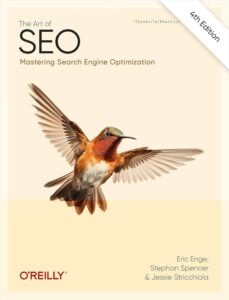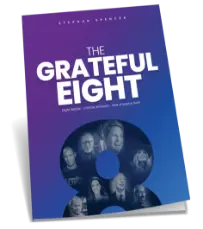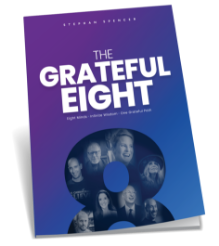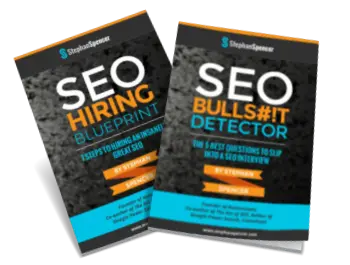The Top 7 SEO Mistakes You Need to Avoid - webinar with Stephan Spencer
Hey everybody, we’re going to start the webinar, and we’ll give it about a couple more minutes, but we figured it’s a chance for everybody to speak and ask us any questions. This is Khalid Saleh. I’m the CEO of Invesp, and we have Stephan Spencer with us as well. Stephan, by the way, has so many different titles, and I call him the SEO guru.
How are you doing, Stephan? You are in my book. Like, you know, when I have questions, I come to you.
Thank you. And if you guys want to let us know where in the world you are and what the weather’s like outside, that’d be great. Just type into the Q and A box where you are in the world.
And what the weather’s like? I’m in beautiful Santa Monica, and it’s a little overcast, but I can’t complain. I mean, it’s usually perfect weather year-round. And you, Khaled, are in an amazing part of the world right now. Where are you?
I am in Cancun, Mexico. How about that? With the 83-degree weather coming from snow last week in Detroit, Michigan, this is my first vacation in almost two years. I’m loving it. My three-year-old woke up today. He said, “You know what? Dad, I think we should stay here.” I’m like, “Yes, I would love to.” He loves the hotel room, you know, he loves the weather. He is like, “Well, we should live here.”
Well, going to school in a hotel room might pose a problem, but you know, other than that. I see people are joining us. And answering as well, saying where they’re in the world. Let’s read off some of those answers.
Let’s see. Can you see the answers? Can you see the questions? By the way, Stephan, did I ever tell you I used to be? The last project before I started Invesp was GoToMeeting and GoToWebinar. I used to be their software architect.
I did not know that.
Oh, yes. I mean, that’s the reason I have an affinity for the software. I’m like, yes. Now, that was like, no, 13 years ago, but it’s funny, and I’m sure they’ve gone through, I mean, you know, how does he go through iterations, but it still looks the same, by the way, as 13 years ago.
Well, that’s why I switched to zoom because it still looks the same. Where’s the innovation? Well, you know, what happened is you left.
There you go. It’s interesting because, I mean, companies sometimes get stuck, and every year on renewal, I think about whether I need to switch from going to webinars to Zoom or something else.
And I read the reviews, and I’m like, you know, this is all. It’s almost like, you know, all the same, which is a challenge, by the way. Online companies have that, you know, I mean, they think of themselves as different, but they’re really too in the eye of the consumer. And in this case, they all look the same.
Well, should we start?
I think we’re ready to start. Let me start, and I’m assuming everybody can see my screen. Very good. Hello, everyone. Thank you for joining a new webinar by Invest today. We have an absolutely awesome speaker. I’ve heard him talk and speak for the last 12 years or so since I started investing.
We have Stephan Spencer, who is an SEO genius, an SEO expert, and an SEO guru. And I rarely use this word. He’s been in web development, web design, SEO, now for, oh man, I don’t want to date you, Stephan, but over, you know, probably. What we’re talking about, like, not 30 years
29 years.
Yeah. I rounded it up, but I’m like, Oh my God, I mean, that shows you, like when somebody has been in the industry for so long, he just knows so much, not concepts of the company I knew about, like, you know for a long time. What was cool about it was that it had two offices, one in the U.S. and one in New Zealand, which is a really cool place to have an office in.
I’m not sure about the back-and-forth travel. It was acquired in 2010. Since then, I think Stephan has been picking and choosing good clients to work with and speaking at a ton of conferences. I just asked him which conference, and maybe he can share that with us.
He authored three books on search engine optimization and has two amazing Podcasts, Get Yourself Optimized and Marketing Speak. Both are highly recommended. I can just spend another whole webinar talking about stuff. And then he’s a really dear friend.
So, with that, let me turn it to Stephan. Stephan, thank you for joining us. I know you’re, but it’s a bit early, and your schedule is always busy. I appreciate you taking the time to join us.
Well, I appreciate you having me on and letting me speak to your community. Let me share my screen here, and we’ll get started. Okay. So let me know if you can see my screen.
I can see your screen.
Perfect. We will go through the top 7 SEO mistakes you need to avoid. And pretty much every site suffers from most, if not all, of these. Let’s see if your site suffers through them as well. Now, I’ve been doing this a long time, as Khalid has said, a very long time, and worked with some very large brands over the years, and I do want to give an additional little plug to the two podcasts. It’s like a mini education, with many university-level education in SEO and online marketing to subscribe and listen to the Marketing Speak podcast.
Khaled has been a guest on that show. So has Seth Godin, Dan Kennedy, and Jay Abraham, some of the marketing legends of our time and also some of the most skilled SEOs, paid search optim, paid search people, Facebook ads, folks, like top people. The optimized geek is now rebranded to Get Yourself Optimized.
Ah, that’s why I didn’t know that.
That’s as of the first of the year. So, that podcast is not an SEO podcast, even though it might sound like it. It is a biohacking life, hacking, productivity, and personal development podcast. If you want to uplevel your life, business, peer group, career, or partner intimacy, pretty much anything is fair game if it makes you a better person.
That’s my Get Yourself Optimized podcast. As Khalid alluded to, I do have three books. The one I’m most famous for is The Art of SEO, now in its third edition. I highly recommend it. It’s a little bit of a heavy read.
Let’s just put it that way. It’s a thousand pages. Yes, it is used as a textbook, and in some universities, Social e-commerce is just like it sounds all about social media to drive online sales. And then Google Power Search is not. It’s really an SEO book, but SEO is used. It’s all about how to be a power user of Google.
How do you find anything like confidential business plans or your competitors forced to research reports that normally cost thousands of dollars? They’re all at your fingertips with the right kind of Google search. I’ve even found credit card number files with expiration dates and no, that’s not in the book.
I have a question for you guys. What’s the hardest part about driving traffic to your site right now? Where are you getting the most stuck? What’s your biggest challenge? If you could type into the Q and a box, uh, and then how can it read those aloud? That would be fantastic. So, take just a moment here.
This should go without saying, but please, if you are doing other things like email or texting or anything like that, please put those things away because I want you to get the maximum value from this webinar. And that means. Give me 100% attention, and I’ll deliver 100% to you as well.
Please just take a moment to type into the Q and A box. The hardest part about driving traffic right now is whatever.
Let’s see. I can’t figure out the rules anymore; it’s always changing. I guess that’s a good and a bad thing at the same time.
I look forward to the changes because they keep you on the cutting edge and a step ahead of your competitors. If you embrace change, you’re bulletproof.
Again, like, you know, what works, needing to know what works, exactly. I think those are kind of the main things, you know, I mean, yeah, okay. The main ideas here.
Okay, cool. Thank you to those of you who chimed in on that. The good news is there are simple things that you can do to fix your SEO. You just don’t know what they are. You don’t know what you don’t know, and that’s always a problem. In fact, developers have this problem. Designers who are designing your layouts and so forth don’t understand the implications of what they’re doing, which can hurt your SEO inadvertently.

Developers and designers often don’t realize the SEO impact of their work, which can unintentionally harm your SEO.
The folks who are writing copy, the merchandisers, don’t understand which words are the right words to incorporate and which ones are the wrong words. But there are some simple technical fixes. In fact, you don’t have to be a rocket scientist or a developer or systems administrator to understand that these things are broken on your site.
If you don’t have the tools to fix it yourself, you can ask your IT team to make these changes. We’re going to go through these seven big mistakes, but I just want to reiterate that you’re in good hands here. I’ve been doing this for a long time, working with some of the biggest brands in the world.
Chanel, Volvo, Sony, Zappos, CNBC, Bloomberg Business Week, Quicksilver. I could go on and on, and I’ve earned them many millions, tens of millions of dollars more than that, I’m sure. I haven’t edited it up. I don’t think I could, but the point here is that you’re in good hands; these things work. And they’ve worked for many really big clients. They’ll work for you.
Now, Stephan, let me ask you a question because I always hear this. So, what works for big clients? Do you think it will also work for smaller clients?
Yes, for sure, because if you have an issue that is creating, let’s say, duplicate content on your site, or you have thin content that you didn’t mean to get indexed, but it is, It doesn’t matter if you’re one of the biggest sites in the world, or you are a small site.
In fact, it can be even more beneficial for a smaller site and a smaller company because it seems like the bigger brands get away with a lot more in Google. The Google algorithm forgives them for mistakes, faux pas, and misconfigurations a lot more. Yes, this is universally applicable stuff.
I think the smaller sites even have more to gain percentage-wise in terms of traffic increases. I can only fix so many sites. I can only do so many SEO audits. As Khaled alluded to, I’m selective about who I take on as clients since I sold NetConcepts and created a smaller consultancy.
I only work with a handful of clients at a time. I want to teach you how to apply some of these ideas and strategies on your own. And like I said, just ask your IT department to make these changes and not have to be involved. An agency or an SEO team to make these fixes. They’re almost like do-it-yourself type opportunities, DIY.
Now, the key kind of fundamental to good SEO is having the foundation, right? Your underlying foundation is what you build upon, like a house. You want to have a solid foundation and not a shaky one because, you know, that could be really bad, especially if an earthquake comes or whatever. So, we want to have a very solid foundation.
It starts with technical SEO, getting the configuration right of all the different things from hreflang tags, canonical tags, Schema.org markup, and redirects. All of it, right? And there’s a lot of nuance to this. With that said, I’m going to give you some really straightforward tips and tricks that will help you elevate your rankings and your traffic.
And we’re going to start with (1) Your keyword targeting is off. You just didn’t know it yet. You’re not identifying question-based keywords. You’re not targeting featured snippets. Maybe you’re still using the Google keyword planner as your primary keyword research tool, heaven forbid. You know, these are big faux pas, big mistakes, and I’ll explain why.
So oftentimes, we’re targeting the wrong keywords, and it’s not because of ignorance. Well, maybe it is, but it’s also because of just business or rules that prevent us from doing our best work and having our best foot forward. A great example of that is Westpac Bank, a big bank in Australasia. It was a client, and their legal department told them they could not use the term mortgage anywhere on their website, which is a really bad idea. By the way, as you can see from this keyword popularity graph, it does not look like home loans are searched on hardly at all in comparison to mortgages.
It’s just a night and day difference, right? They had to use the term home loan everywhere because, apparently, a mortgage is a legal instrument, and Westpac doesn’t offer that. The legal department, also known as the business prevention department, got in the way of ranking for the term mortgage, which is where all the traffic was.
That was a bad idea. Another fun example is here. A department store chain in the U.S., which was also a client, began with a K and ended with an S. They were very focused on a keyword that I thought was kind of silly: kitchen electrics. I hadn’t even heard that term before, but apparently, that’s an industry term referring to small kitchen appliances that are on the countertop, usually food processors, blenders, toasters, et cetera.
Well, they wanted to rank very highly for that keyword, and I’m trying to convince them that this is actually not a good use of their time and focus because nobody’s searching for that keyword. Perhaps only the CEO, but if the CEO is searching, you don’t want to take a chance that you lose your job because you’re not ranking for that unimportant keyword.
So, sometimes, education needs to go all the way to the top of the company in order for you not to lose your job. But this is another fun example of targeting the wrong keywords. Now, the right keywords can be ones where it’s not. Entirely intuitive. It’s not exactly your target market. Let’s say that you’re selling baby furniture online, for example, bassinets and cribs and so forth, and you start typing in the word baby into Google, and you get these suggestions back auto-complete suggestions.
That’s called Google Suggest. And one of the first keywords that comes up as a recommendation is baby names. And you might think, “That’s interesting, but I don’t sell baby names. How will I make money off of baby names?” Right? But suppose you think about where people are: the expectant parents are your target market, where they are in the buyer journey. In that case, before they start thinking about the baby’s room and how to outfit it with all the right furniture, toys, and everything, they’re thinking about what?
The baby’s name, right? So they come back from the ultrasound and find out it’s a boy or a girl, and they hop onto Google and search for baby names, not baby furniture. That’s too soon, for it’s too soon for that baby’s name. If you can offer a lot of value in terms of baby names, like Helpful tools or idea generators or baby name meanings or something that is a little more original and different from everything else that’s out there so that you kind of stand apart.
You could bring in a lot of traffic, and this is exactly the traffic you want. Who else is searching for baby names? It’s only expectant parents. So here’s an example of thinking kind of laterally, a little bit outside the box and earlier in the buyer journey. All right. So let’s move on.
I like that a lot because lots of times we exclude some ideas, but you just, I love the way how you linked it together. It’s like they are in your, like, you know, buyer journey and maybe a bit earlier. And that’s really where you want to target them. You want to get them and offer them, like you said, something unique. So I love that.
Yeah, and to connect the dots even further, imagine offering the essential nesting checklist over on the side or in a pop-up saying, you know, download this free comprehensive tool that will help you outfit your baby’s room with all the right things. The furniture—should you get wood, or should you get metal? Should it be painted? Should the crib have a mobile above it? And all these sorts of things that you can guide them through. Your own ideas and recommendations. In other words, you’re influencing their buying criteria. Yeah, that’s very cool.
All right. So, let’s move on to (2) Your weak content. Ouch. That hurts. And what do I mean? What do I mean by that? Well, you’re not appealing to the link karate. It’s like the digerati or kind of the Illuminati of the online world; who does Google think is important, trusted, and authoritative?
That’s who we need to target with our content marketing campaigns. And if we’re creating content that’s only valuable or useful to your customer base, you’ve missed out. You created something that’s not link-worthy. Suppose you have duplicate content, which I alluded to very briefly earlier. You know that the bane of the SEO person’s existence is having content replicated on their site in multiple places or on other sites as well. You’re competing with your own content over and over again, or you’re using your manufacturer’s content without tweaking it, paraphrasing it, or adding additional value. Inadvertently, you’re competing with all the other retailers out there that carry the same products from the same merchandise or same manufacturers, thin content.
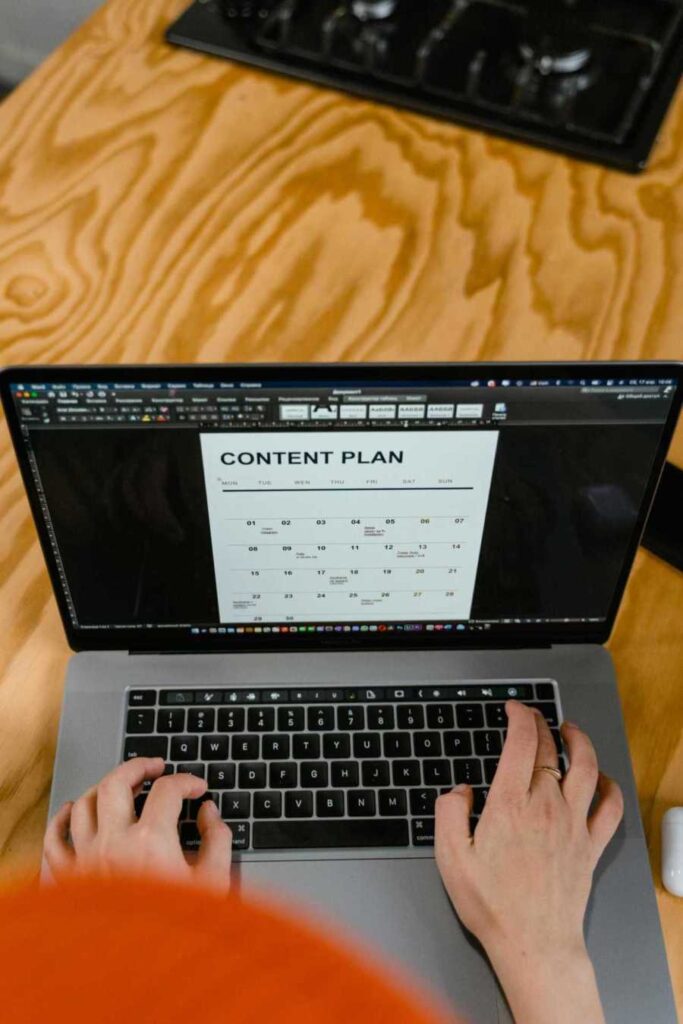
Create content that appeals to influencers and experts, not just customers. Focus on shareable, valuable material, collaborate with key figures, and ensure it’s linkable to boost reach and authority.
That’s where the content is not meaty. It may just be a little bit of text and some images, and that doesn’t look good. Or maybe it’s zero search results pages or error pages showing up in the search results. That sort of stuff is not going to be helpful for you or your SEO. Adding heavy pages can get you in trouble.
Walls of text that are not easy to read create a lot of bounces. So, the bounce rate is high, and that’s the dwell time is low. These are all issues. This is kind of fun to get you thinking a little outside of the box. This is a company that is very tiny.
Lifeinsure.com is an insurance brokerage with I think fewer than a dozen employees, at least last I heard. And this article was not even linked to from anywhere on their site. It was not published on their blog or anything. It was essentially an orphan page, but then their SEO consultant, somebody I know, a friend of mine in the industry created this edgy article and then submitted it to the Reddit of the day, which was Digg.
Back then, it was not a relevant site anymore, but Reddit is certainly Super popular. It’s kind of the front page of the internet. So imagine this getting to the front page of Reddit. Well, that’s essentially what happened, and they got tons of links to this article, which lifted the rankings. Not it’s the rising tide that lifts all boats. Every page benefited. Consequently, they ranked on page one in Google, Bing, and Yahoo, of course, two for life insurance For life insurance and not this article.
It was their homepage, and they stayed there for years because of this one article, which is really kind of creepy, and I’m not going to read any of the bullets on here. But they created something that was not meant for customers at all. So, I’m just being extreme here.
I’m not saying that you have to go completely off-brand and do something this edgy, but I’m just showing you an example of thinking outside the lines and what it can get you. I mean, they were right there on page one. Geico, MetLife, and State Farm were 12-person companies. Crazy, right?
And what’s amazing is, I mean, these companies, each brand that you mentioned, is humongous, humongous SEO, humongous digital marketing budget, humongous everything. And here’s one article that’s just like, okay, well, just the right targeting, smart, edgy, and okay, we’ll beat them all.
Pretty wild. Okay. So here’s another example: Build Direct has an e-commerce site where you can buy home renovation and supplies. And they did some edgy articles like this one, redneck home remodels, that got them a lot of play on social media, but the social media visibility is a means to an end.
Because the social links and visibility don’t directly equate to higher rankings, it’s only when those people you’re reaching through social media include the linkerati that they’re linking to you. And that’s exactly what happened. And they got a lot of links from this edgy article about Redneck Home Remodels.
There were some funny pictures, which I’m not going to scroll down through and show you. But Google it if you’re interested. Okay, (3) You have unnatural linking patterns in the big mistakes. And again, you don’t know it. You don’t know what you don’t know about this and its toxic links.
There’s not enough diversity in your link profile. The best way to check if you have toxic links is a tool called Link Detox. It’s fantastic, and then you’ll get a score back, a Link Detox score. It’s from a tool set, a company called LinkResearchTools.com, and they have several dozen different tools in their toolset, Link Detox being one of them.
You should be doing a Detox check at least quarterly because you might be the unwitting victim of a negative SEO attack. Yes, negative SEO is a thing. Your competitors, your affiliates, rogue affiliates, and people who just don’t like you can target you, and the way that they target you and hurt your rankings in Google is by buying or building low-quality links to your site as if they were you.

Perform a Detox check quarterly to avoid being a victim of a negative SEO attack.
Google doesn’t know that it’s not you, especially if you’ve done stuff that was a little sketchy in the past, you know, and then that looks like you, that’s on your rap sheet. It looks like you’re more inclined to do something like this: buy low-quality links, and for 100 bucks, they can really sully your reputation in the eyes of Google.
You have to be on top of this sort of stuff. And here’s a power tip: Find power users who will help you. The Linkarati can be partnered with, right? I have a whole article on that in Search Engine Land called the Social Media Underground. It’s an old article but a goodie. It’s still valid, and the idea is in there.
And here’s just an example of that in action. Overnightprints.com was a client of mine, and I came up with this idea for a contest called the Business Cards for Life contest. In actuality, the prize was not that impressive because it’s a thousand business cards a year for up to 20 years.
So that’s like pocket change. I think I have enough money in my wallet to cover that, right? So, the thing that made the difference was finding a power user as an integral component of the campaign. In this case, it was Jeremy Schoemaker, AKA Shoemoney, a famous internet marketer who got a big following, and that’s him right here with the winning entry of the contest.
It’s like a chip card. Back then, it was much more kind of cutting edge to have a business card that looked like a chip card, and you flip it over, and it’s got his signature and a little white stripe. My client went from nowhere for the term business cards to number two within about six months because of this campaign, and that’s it.
Just this campaign. Isn’t that amazing? That is an example of how you can think outside the box and create some content that is really compelling. That is remarkable. That’s worthy of people linking to you. And then you target. The link is Karate. And in fact, you can partner with them and get some really big rewards. Okay. So, we’re going to power through these next few here quickly.
(4) You’re not crawling your site. And you might be crawling your site, you know, occasionally, but you’re not doing it regularly enough, or you might be using a tool. That’s not really the best-in-class tool. One example of a best-in-class tool for crawling your site from an SEO standpoint is Ryte, formerly known as onpagee.org. That tool is awesome. DeepCrawl is also fantastic. OnCrawl is another one. That’s really good. These are hosted in the cloud. Their software is a service, so they’re not going to use up all your bandwidth.
They’re not going to take up all your computing power on your laptop while you’re trying to do email. Screaming Frog is a great crawling tool that’s much lower budget, but it does run on your desktop computer and takes up your bandwidth. It depends on your needs, but use a tool that crawls your site on a regular basis.
It’s really important, and that’ll find you all sorts of issues with missing title tags or overly long title tags or the wrong kind of redirects in place or four or four errors, five or three errors, et cetera, et cetera. Okay. (5) You’re Not Optimizing Your Page Speed. What I mean by that is that your load time is acceptably slow, and Google puts this into the weighing criteria and the factors that it uses to determine where you should rank.
It’s especially pertinent for mobile users. People are doing mobile searches. You’re much more susceptible to getting downgraded in the rankings because you have a slow-loading website. There are lots of tools that will help you ascertain if you have a problem with slow-loading webpages. Of course, Page Speed Insights is a free tool from Google that you should all check your site.
There’s also the Testmysite.Thinkwithgoogle.com tool, which is actually powered by Webpagetest.org. But it’s a great little tool, and it’s free. And webpagetest.org is a free tool. You could use Gtmetrix.com, another great free tool. You can use Lighthouse as a Chrome extension, also free.
These are all excellent and will give you lots of recommendations on how to make tweaks to lower your load time. Okay. (6) Using the wrong kinds of redirects. This might seem like old-school information here, but back in the day, 301s and 302s were sometimes misused from an SEO standpoint, and 301s were always the only correct kind of redirect from an SEO standpoint.
Well, times have changed. And just to give you something that you might want to mull over is Christoph Cemper, the founder of LinkResearchTools.com and also a link expert. He was on my podcast. That episode was about a year ago. I highly recommend you listen to that episode.
And we talked about many different things, but one of them was redirects. And he did a study where he found that 302 redirects actually had a more substantial. RankingsRankings impact from an SEO standpoint over the long term is more than 301s, which is very counterintuitive. So Google came on record to say that 302s are also passing page rank now.
They’re also good for SEO, not just 301s. You’ll find that in Gary Illyes‘s tweets from a while back. So, 302s are not a bad thing from an SEO standpoint unless you’re trying to remove search results from Google. Then, 302s are a problem because 301s collapse the search results into just the destination.
You are else showing up in the search results. But if that’s not an issue for you, then you might want to experiment with three or two. I know we’re running up on time. (7) Here is why your site has not been fully migrated to HTTPS. And you didn’t know it. And you might think, “What? No, we did that two years ago. We migrated.”
The problem is you didn’t know how to search on Google to find the HTTP URLs that are still indexed. You add an in url colon HTTP to your search query for like site colon your domain. com. And that will show all these HTTP URLs. And there’s a great article on Wired about how Wired migrated to HTTPS and they made all these mistakes. They’re very savvy and sophisticated, technically, and they still make mistakes.
If Wired makes mistakes with a seemingly simple migration from HTTP to HTTPS, you probably did, too, and you just didn’t know it. For example, you probably redirected your XML sitemap from the old HTTP to the new HTTPS without keeping an HTTP version alive, which showed Googlebot all the redirects in place.
And you yanked the rug from under Googlebot from discovering all those 301 redirects. That’s an example of how you probably had not quite hit the mark with the migration process. I don’t know why you’re here. If you are here because you’re trying to get more traffic or you’re the traffic you’re getting from Google isn’t high quality enough.
It’s not converting as well as paid search or whatever the issues are. Your competitors are coming in and crushing you, or you have had a big drop off in traffic from Google recently. I don’t know, but usually, what happens is that people get kind of decision fatigue and don’t know what to do next, especially if they don’t have all the information. They’re used to having all the information, and there’s, you know, SEO, which is kind of a black box.
The big question is, what’s the next step for you? Now you have some ideas for some things that you could fix or at least address potentially. And look into but what’s the very next step? What’s the thing that’s going to get you the big bang for your buck? You know, I always believe in taking the road that’s been traveled before and trusting the experts who have traveled that road before rather than trying to reinvent the wheel all the time.
Some people trust me and my advice, like Tony Robbins, Taki Moore, and Steve Spangler, who’s in the National Speaker’s Association Hall of Fame and an Emmy award winner. The SEO lead at Zappos is also saying that I know my stuff. And here’s a really cool offer that I wanted to share with you.
Because, you know, why not? I’m going to give all of you a free 10-minute critique. We’ll pull up your websites and go through different technical content or linking issues in those 10 minutes. So you’ll all get that for free. If you would prefer, though, because, you know, 10 minutes isn’t a lot of time.
I’ll do a 60-minute, deeper-dive critique. I’ll send you the recording, and you’ll be able to share that with your tech team, with your merchandising team, et cetera, so that you can apply my recommendations. I’ll do that for $497, which I think is an incredible offer. I’ll also throw in there an SEO critique worksheet if you want to fill it out.
I highly recommend that you send it to me before our 60-minute call. I will give you feedback on that worksheet. It’s going to walk you through a bunch of things that you need to think about for your SEO roadmap, and I’ll weigh in with my input on that as well. So that’s a pretty darn good offer.
All of you should take me up on the 10-minute offer. That’s a no-brainer, but if you want the deeper dive, the 60 minutes, $497, this is only the second time I’ve ever offered this. I think it’s a no-brainer. I would charge at least $1,197 for it, at least.
I was going to say, Stephan, I know some of my clients who, you know, paid you a lot more than that for the 60 minutes. We’re talking about it. Yeah. Thousands of dollars, by the way.
Tens of thousands, and to make it even more of a no-brainer, I’m going to reverse the risk here and make the risk sit all on me. If you feel like it wasn’t mass massive value for you, that 60-minute critique. And if I don’t deliver at least three SEO opportunities, you didn’t already know about.
Then I’ll give you your money back. So here you go. Definitely, at a minimum, do the 10-minute analysis with me, but you know, the 60-minute one will be much higher value, of course.
And these are not sales calls. I’m not going to snooker you into a pitch or anything. So Stephanspencer.com.s.a.s.m.e/analysis for the 10-minute one and Stephanspencer.com/seo-critique for the 60-minute one, and I’ll keep that on the screen for a little bit, and we can do a few questions if you guys would like.
Awesome, awesome. Well, no, I truly appreciate you taking the time. Incredible. I mean, incredible content, although, like, I follow the industry, I’m by no means like, and I just like to learn enough to, like, you know, make sure that our SEO is running smoothly, but the offers are, they’re, they’re absolutely incredible. So, I should sign up for a 10-minute analysis.
No, I’m going to do the 60 minutes, you know, 60 minutes with you. You know, I mean, like, you know, over the years, like, you know, whenever I ask you a question, you always like, you know, give me like these steps, and it’s like usually over two, three minutes, 60 minutes with you.
It’s just a no-brainer. You know, it’s one of those things that pay for itself. It’s like because if you really get the chance to speak to an SEO expert. And they know their stuff and are definitely on top of that list. You know, just one or two things can really make a night and day difference in a business, and the online business really, it really does.
And, you know, I’ve seen it with my clients. I’ve seen it with us. I’ve seen, you know, at some point, our site used to get 200,000 visitors a month. We dropped because of mistakes I made about 10 years ago. We dropped a thousand visitors a month from 200,000 to a thousand, and now we’re back up to about 60 or 70.
I’ve seen the power of a CEO where it makes a business, destroys a business, and talks to just, you know, 60 minutes with you. That’s just absolutely incredible. Let me ask you a couple of questions. Stephan and I know we’re about to run out of time. We’ll definitely.
I want to include links to many of the tools you’ve mentioned. So maybe you can just shoot each other some emails and put them in the webinar notes.
One of the things you mentioned about duplicate content, especially for retailers, is that most of our webinar attendees can come from an e-commerce background. They take the manufacturer’s product description, dump it on their side, and they’re done. How do you recommend they handle that? Because yes, that is duplicate content to a good extent.
You’re right. So what typically is done to ameliorate the situation is adding some additional content, but then if that additional content is only a couple of paragraphs or something, then the 5, 6 or 8 paragraphs that you’ve added from the manufacturer.
That is duplicate content that far outweighs the couple of paragraphs you added. So, I recommend starting over with a complete paraphrase or rewrite of the product copy. And if you can make it remarkable and highly valuable, remarkable as in worthy of remark, what you write could be more than just a paraphrase.
It could be entertaining, educational, thought-provoking, or well-considered. And just for an example of remarkable product content, I would point you to a site called VAT19, VAT19, VAT19.com. They have the most innovative, clever, entertaining, awesome product descriptions you’ll ever find.
They’re awesome. Also, if you want to see an example of the most amazing, innovative product videos, they crush it. They’ve gotten over 3 billion B views on YouTube for product videos.
That’s awesome. That is awesome. The second question just like in a sense, like, you know, we always come on projects, and we work, we work together, but I’m always interested in yours, your view.
CRO and SEO—how do they work together? I know we’re tremendously impacted by the work that SEOs can do. It can really make our lives tremendously easier and sometimes really hard, but I want to hear your view.
Yeah, so and the best of all worlds, the two things dovetail nicely, work together, and enhance each other. That doesn’t always work. You might get somebody saying one thing on one side of the fence. Let’s take content away because it’s hurting our conversion rate, and then that’s going to hurt your SEO. Or we have to add more keyword-rich copy to the top of the page, and that’s going to push the compelling call to action further down the page, thus hurting the conversion rate.
Ideally, you’re working with a team that plays nice together and understands that one plus one can equal three, and the enhancements that are recommended by the partnership are the two sides working together for the same aim, which is more high-quality traffic that converts. The recommendations they’ve kind of sussed out what works and what doesn’t work from both sides of the fence, and the recommendations are thus coordinated and effective for both sides.
And you know, that’s what I always tell our team because sometimes they complain; I always tell them, “Remember, without having quality traffic, we’re not going to even talk about conversion. There are no visitors. There are no eyeballs.” It’s like, what are you going to do? You can have a site that is just really architected to convert, but if you’re not getting the traffic, then it’s useless.

A well-designed site won’t matter if you’re not getting traffic.
And at the same time, you want to make sure that you’re getting that really high-quality traffic because I’ve also seen, like, you know, some SEOs that come in and drive lots of traffic. And I’m like, Oh, it’s really not targeted.
It’s not well thought and does not relate to anything that the site does. And it’s actually not the CEOs. I would have to say, like, you’re probably more with social media people who are working in the social media, and it doesn’t, it doesn’t really, it doesn’t really help. With that, I think we’ve passed the time.
We’re going to put a link to lots of the tools that you mentioned in the webinar. Notes: The offer is absolutely amazing. I’m going to actually include this offer for the people who registered. They’ll get an opportunity to see it. Really appreciate you taking the time, Stephan. Thank you, everybody, for attending the webinar. The recording will be up on our YouTube channel this coming Monday and we’ll have our next webinar announced by then.
Thank you all for attending again. We’ll talk to you soon. Bye-bye, everyone.
